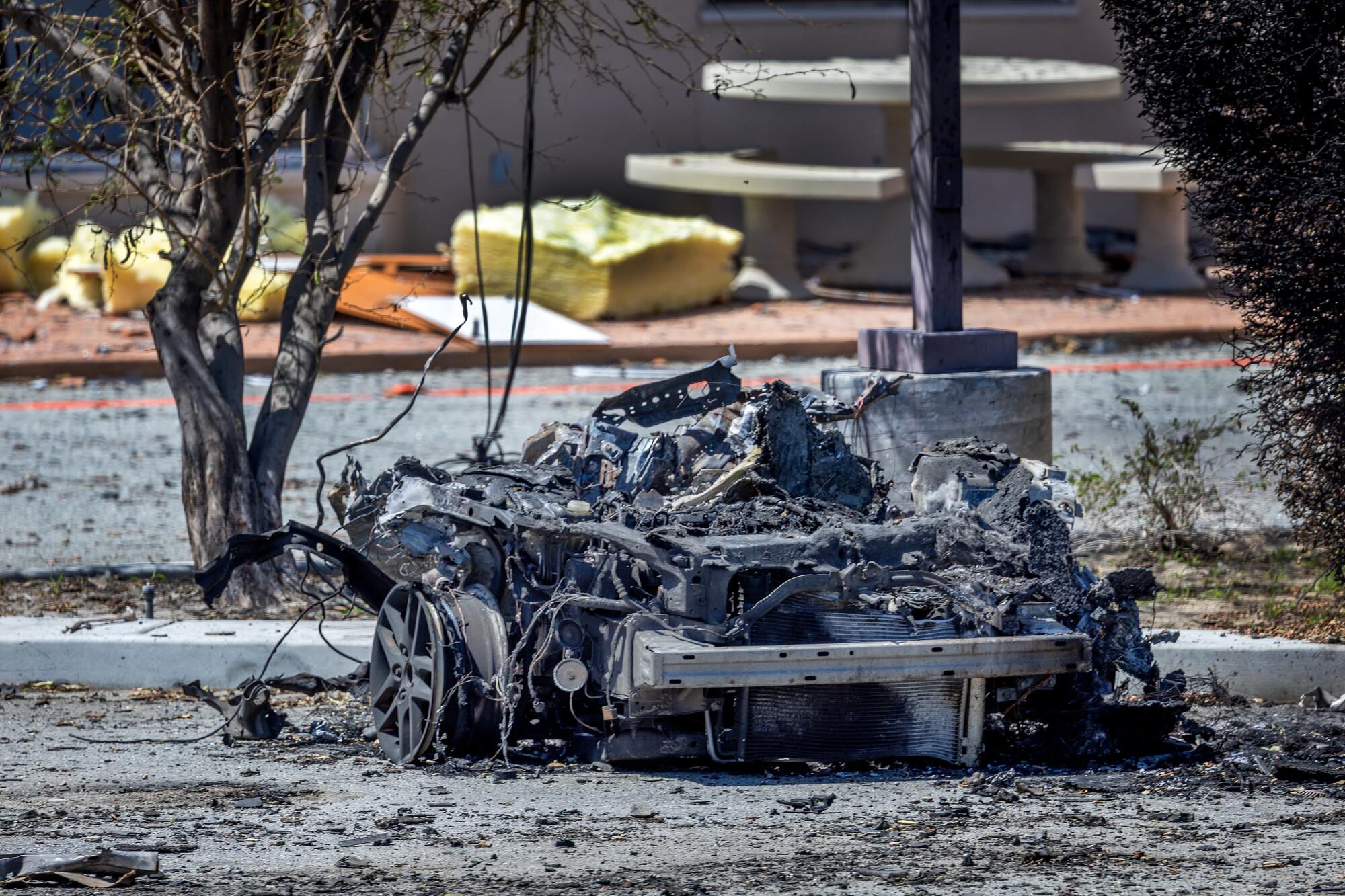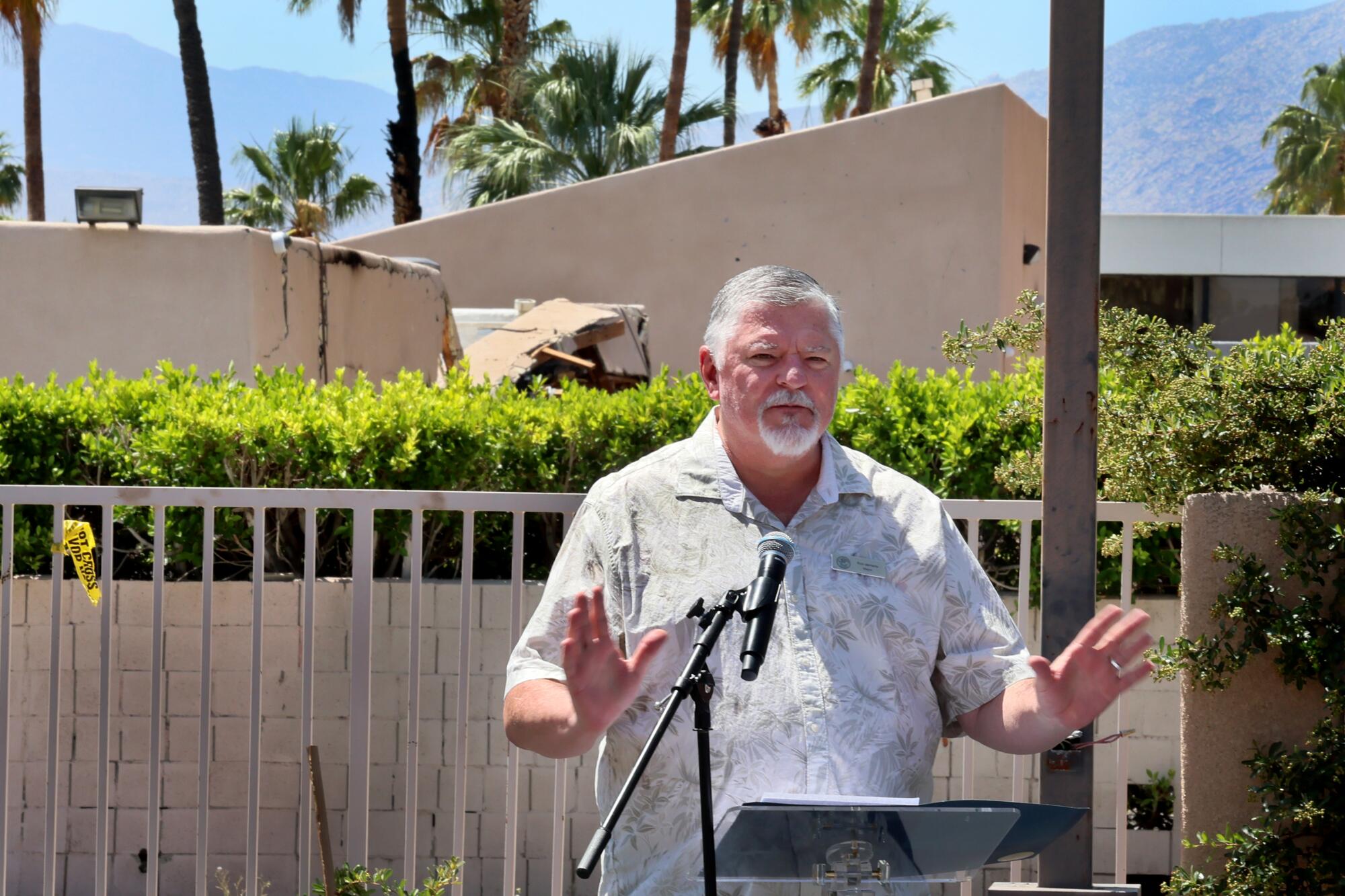PALM SPRINGS — Less than a week after a targeted bomb explosion nearly destroyed his fertility clinic, Dr. Maher Abdallah stood below the blazing desert sun in front of a liquor store, its windows blown out by the powerful blast. Behind him was what remained of American Reproductive Centers.
The clinic — the Coachella Valley’s only full-service fertility center and IVF lab, according to its website — had been relegated to a crime scene. All four buildings will need to be demolished and replaced, a process that could take up to two years, he said. Still, he dismissed the destruction as “material loss.”
In what Abdallah described as a series of miracles, nobody was in the clinic last Saturday morning and its in vitro fertilization lab remained intact despite the mighty force of the explosion. The attack knocked out the electricity that powered the facility’s incubators and damaged the backup generator, but emergency responders rushed in to address the outage and ensure that the thousands of frozen eggs, sperm and embryos stored in cryogenic tanks went unharmed.
He later learned that of the 14 embryos that were dividing in incubators at the time of the attack — all belonging to one same-sex couple — eight had become “perfect blastocysts,” or balls of cells that form early in pregnancy.
Saturday’s bomb blast in Palm Springs caused large portions of the American Reproductive Centers facility to collapse.
(Allen J. Schaben / Los Angeles Times)
“My return on the investment is babies,” said Abdallah, whose clinic claims to have helped more than 2,000 couples grow their families, many of them in the region’s LGBTQ+ community. “Life is preserved, and that’s really all I care about.”
The bomb that detonated at the fertility clinic in this resort city last Saturday injured four people and killed the suspected bomber, 25-year-old Guy Edward Bartkus, who lived about an hour away in Twentynine Palms. The FBI has labeled the incident as domestic terrorism.
FBI case investigators, as well as law enforcement sources, characterize Bartkus as having “antinatalist” ideations, a conclusion drawn from social media posts and other online materials authorities have linked to him. In those public posts, he argued that procreation without the consent of the unborn is unethical and unjustifiable in a world struggling with environmental harm, violence and overpopulation. In addition, the posts indicate he was mourning the recent death of a friend.
A website that authorities link to Bartkus laid out the case for “a war against pro-lifers” and said a fertility clinic would be targeted. “Basically, I’m a pro-mortalist,” the author wrote, referring to a fringe philosophical position that it is best for sentient beings to die as soon as possible to prevent future suffering.
At a news conference Thursday, Abdallah told the throng of local officials and reporters gathered that he forgave the suspect and had instructed his staff not to talk about him.
When asked about the bomber’s ideology, Abdallah said simply that he was “for life” and didn’t care to weigh in further. The only reference to the suspect came from Abdallah’s business partner, who said the doctor had requested he reach out to Bartkus’ family and offer to pay for his funeral services.

The remains of the car used in Saturday’s bomb attack sit in a twisted pile outside the American Reproductive Centers in Palm Springs.
(Allen J. Schaben / Los Angeles Times)
Instead, Abdallah said he has turned his focus to the future. Just days after the bombing, the clinic was offering basic ultrasounds at another medical office. Next week, American Reproductive Centers will temporarily relocate to a surgical center across the street.
Abdallah vowed to rebuild the clinic on the same site in uptown Palm Springs, across from the local hospital. The facility was well-secured, he said, with cameras on every corner and facing the chained cryogenic equipment. But in the future, he said, he also wants guards to patrol the premises.
“We will rebuild, we will grow, and we will continue to help families grow also,” said Abdallah’s cousin and business partner, Amer Abdallah. “We believe in miracles. We witness them every single day. And no act of hatred can stop us from bringing those miracles into this world.”

Palm Springs Mayor Ron De Harte said the city is working to bring “every possible resource” to the residents and small businesses affected by the bomb attack at American Reproductive Centers.
(Allen J. Schaben / Los Angeles Times)
Palm Springs Mayor Ron deHarte said the city is working with state, regional and county offices to bring “every possible resource” to the residents and small businesses impacted by the blast, which was reportedly felt more than two miles away and damaged windows and walls in nearby buildings.
He said the City Council would be looking into creating programs to support damaged businesses, including reducing fees for building permits and expediting the processes for obtaining new permits, business licenses and inspections.
“This act,” he said, “will never deter us. Love always triumphs in Palm Springs.”
This article is part of The Times’ equity reporting initiative, funded by the James Irvine Foundation, exploring the challenges facing low-income workers and the efforts being made to address California’s economic divide.










